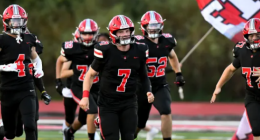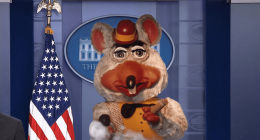Dr. Seuss has been acclaimed for many of his children’s works. The reason for his genius is his ability to bring into his short stories real world problems that the children have either heard before or can relate to. For instance, The Lorax depicts the global littering problem and shows the consequences to this predicament as well. The Butter Battle Book shows the effect of the Cold War on families and governments. Yet all those who are avid Dr. Seuss readers have overlooked the greatest of his short stories, Hop on Pop, which has taught three generations about life and suffering.
The problem that has torn apart America for decades is the problem of “big business.” Far too many times has a small business had to sell out to a bigger business because the bigger business has been able to lower prices. This has always led to a monopoly and a failing economy. Dr. Seuss cries for anti-trust laws in his Hop on Pop on page six and seven when he claims, “Mouse, house. Mouse on house. House mouse. House on mouse.” The symbolism Dr. Seuss uses when he gives the metaphor comparing the mouse to small business is astounding. The house, of course, then represents big business. As the mouse sits upon the house, it shows an equal partnership between the two. But this can only happen when the mouse (or small business) comes first. This explains first sentence where the mouse is listed first. When the needs of the small business are taken care of, then there is an equal share in responsibility to the customer and equal, fair, competition to help both sides. The second picture depicts the mouse struggling over a hill carrying the house; this could only mean that when big business is taken care of first, their prices cannot be matched by the smaller business, and they will struggle.
The problem which today’s generation still has trouble comprehending is the problem of racism. Dr. Seuss evidently congregates this problem in his book when the victim lies in the ethnicity of “brown.” Everyone hears from a small age of racism and its ability to hurt, yet only Seuss is daring enough to show it to children. “Brown down. Pup is down. Where is brown? … Mr. Brown is out of town” (Seuss 44-47). The dog, named Pup, is seen as a superior to Mr. Brown. This is seen when Pup is able to knock Brown off of the scale. This shows he carries more weight in society. This also shows how Brown is less powerful than a dog. This is also seen when Mr. Brown is thrown out of town by the dog. The dog smiles as Mr. Brown flies out of town. He is pleased to see his hate crime in actions while Mr. Brown’s frown is seen all over town; the dog has put down the masses below on ground. Seuss also shows that when one is denied rights, he will come back to fight, stronger than before. This is apparent when Mr. Brown comes back with Mr. Black. They smile and eat a last dinner with the pup before an inevitable fight.
This educational book opens the eyes of its younger readers by showing sexism in action. This book is in the “easy reader’s” section and therefore is meant to be read by the young and the impressionable. After reading this book twenty-six times front to back, I realized that there is no mention of anyone of the female gender. Of course, because it is a Seuss book, there are characters without a sex at all. Seen through names like Ned, Pat, Will, and Jim, it is apparent that there are no girls in this book besides a depressed mother with an illiterate child, (page 58-60) and her daughter. Both aren’t given names, yet most men in the book are. This is saying that women don’t deserve names and that men are superior. This patriarchal ideology it instills upon children is that in order for women to get ahead in life they must be literate. If the world were left to men, there would only be depressed dads and children jumping on their parents.
The genius of Dr. Seuss is overwhelming and secretive. Though Seuss hides it well in some books, in others, such as Hop on Pop, the meaning is obvious and thought provoking. In this short book, he teaches children about life and how to get by. Be free, be creative, and screw big business.



